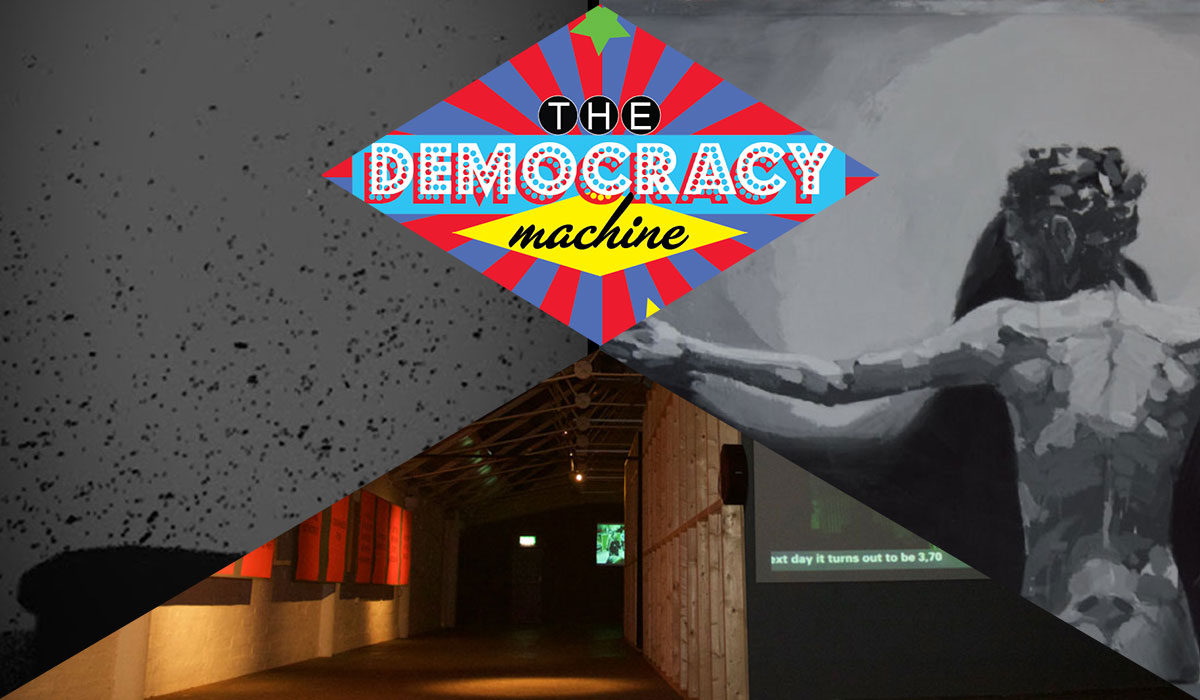
BE’s Visual Arts Programme is a two-year cycle exploring a particular theme. In 2015-2016 we aim to gain insights into the concepts of democracy, citizen participation, and to explore the risks and benefits of digital technology as a democratic tool.
Across the world there is a changing societal shift in the way we think about our roles in building a more harmonious and equitable society. This renewed sense of ‘collectivism’ will be conveyed through the visual arts programme where artists from across Europe will be housing specially commissioned installations.
Specially commissioned for BE FESTIVAL, The Democracy Machine! is a brand new interactive work giving audiences the opportunity to engage in ‘live democracy’ as part of a multimedia gaming installation devised by Adam J. Scarborough. The Glasgow-based artist aims to challenge participants to work together to understand what makes a ‘better’ society.
Composed of two electronic polling stations and a gaming screen, the work poses specific questions to groups of participants who will use twitter and the hashtag #democracymachine to decide on the topics of the day.
The installation is a development of recent live work Please Wait to be Seated (2013) exhibited at The Arches in Glasgow; this time taking inspiration from Las Vegas casinos, gambling machines and quiz shows to bring the dynamics of debate, decision making, and political discourse into a playful game.
Adam’s work utilises text, performance and embodied activity as a medium for personal exchange and social transformation, empowering individuals to become more actively involved in the discourses that form the fabric of the places in which they live.
To get involved in this brand new artwork, we want you to tweet your debate questions to us using the hashtags #democracymachine and #BEdemocratic. All questions should be in a Yes/No format, such as ‘Should teachers be paid more?’, or ‘Should all drugs be legalised?’, or ‘Should our transport system be renationalised?’. What does your future society look like? Now is your chance to find out.
www.adamjscarborough.com
11 million people in the UK lack basic digital skills and 6.7 million have never used the internet. Online access discrepancy overlaps into the field of political participation despite recent and optimistic overtures surrounding technology as a tool for facilitating change.
Birmingham visual artist Natalie Linda Jones presents a mixed media installation using dismantled technology, disintegrated books and threading techniques to explore issues around digital inequality. She aims to unplug the silence about who is able to access digital technology and who is represented through social platforms. Should technology be regarded as a democratic mode of subversion?
Natalie’s work is often a critique and challenges social assumptions. She believes art has the responsibility to explore and inform political equality and was recently moved by Birmingham’s local library closures throwing forward the question of accessibility. The Public Libraries Act in 1850 gave rise to the theory that free learning spaces would give rise to unhealthy agitation. By the reckoning of performance space as a place for potential dissent, the replacement of libraries with digital technology should carry with it a warning. Her work unapologetically questions our international futures.
natalielindajones.squarespace.com
Democracy is a status update, free choice in a rigid system, the profound indifference that shines out when we smile. Like, reply, reblog, put a cross (X) and add a comment. Click, select, curate. These are the basic requirements of the 21st century citizen and failure to take part marks us out as worryingly apathetic. Our actions validate outcomes that have already been decided, in which our input is not required. What we say is not important, the only requisite is our participation. Participation in in exactly what, is never entirely clear. We Like brings a collective working process to inhabit BE 2015 that engages the spirit of democracy in the post-internet age.
The collective has previously worked together in 2014 with their work ‘Repeator’ and all come from different backgrounds of graphic design, time based media and cross disciplinary respectively.
Two of the collective will work within the space between the Studio and the main stage each evening of the festival at the following times:
Tuesday 23 June: 8pm – 9:30pm
Wednesday 24 June: 8pm – 9:30pm
Thursday 25 June: 8pm – 9:30pm
Friday 26 June: 8pm – 9:30pm
Saturday 27 June: 3pm – 4:30pm
www.keithdodds.com
www.cathywade.co.uk
In his work, An Wei explores authority and the ways in which institutions exercise control within society, using a visual language that mixes street art with traditional painting. He is visiting the festival to take part in a residency and to develop an installation that will be revealed at the 2016 festival.
www.anweiluli.com